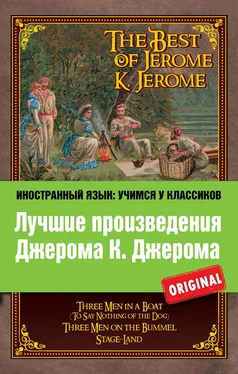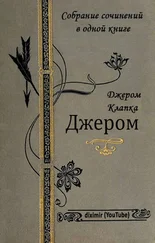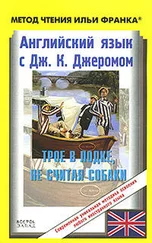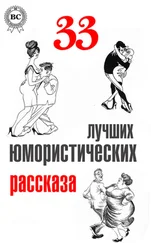There is a good deal to be said in favor of the adventuress. True, she possesses rather too much sarcasm and repartee to make things quite agreeable round the domestic hearth, and when she has got all her clothes on there is not much room left in the place for anybody else; but taken on the whole she is decidedly attractive. She has grit and go [198]in her. She is alive. She can do something to help herself besides calling for “George.”
She has not got a stage child – if she ever had one, she has left it on somebody else’s doorstep which, presuming there was no water handy to drown it in, seems to be about the most sensible thing she could have done with it. She is not oppressively good.
She never wants to be “unhanded” or “let to pass.”
She is not always being shocked or insulted by people telling her that they love her; she does not seem to mind it if they do. She is not always fainting, and crying, and sobbing, and wailing, and moaning, like the good people in the play are.
Oh, they do have an unhappy time of it – the good people in plays! Then she is the only person in the piece who can sit on the comic man [199].
We sometimes think it would be a fortunate thing – for him – if they allowed her to marry and settle down quietly with the hero. She might make a man of him in time.
There are two types of servant-girl to be met with on the stage. This is an unusual allowance for one profession.
There is the lodging-house slavey. She has a good heart and a smutty face and is always dressed according to the latest fashion in scarecrows. Her leading occupation is the cleaning of boots. She cleans boots all over the house, at all hours of the day. She comes and sits down on the hero’s breakfast-table and cleans them over the poor fellow’s food. She comes into the drawing-room cleaning boots.
She has her own method of cleaning them, too. She rubs off the mud, puts on the blacking, and polishes up all with the same brush. They take an enormous amount of polishing. She seems to do nothing else all day long but walk about shining one boot, and she breathes on it and rubs it till you wonder there is any leather left, yet it never seems to get any brighter, nor, indeed, can you expect it to, for when you look close you see it is a patent-leather boot that she has been throwing herself away upon all this time.
Somebody has been having a lark with the poor girl.
The lodging-house slavey brushes her hair with the boot brush and blacks the end of her nose with it.
We were acquainted with a lodging-house slavey once – a real one, we mean. She was the handmaiden at a house in Bloomsbury where we once hung out. She was untidy in her dress, it is true, but she had not quite that castaway and gone-to-sleep-in-a-dust-bin appearance that we, an earnest student of the drama, felt she ought to present, and we questioned her one day on the subject.
“How is it, Sophronia,” we said, “that you distantly resemble a human being instead of giving one the idea of an animated rag-shop? Don’t you ever polish your nose with the blacking-brush, or rub coal into your head, or wash your face in treacle, or put skewers into your hair, or anything of that sort, like they do on the stage?”
She said: “Lord love you, what should I want to go and be a bally idiot like that for?”
And we have not liked to put the question elsewhere since then.
The other type of servant-girl on the stage – the villa servant-girl – is a very different personage. She is a fetching little thing, dresses bewitchingly, and is always clean. Her duties are to dust the legs of the chairs in the drawing-room. That is the only work she ever has to do, but it must be confessed she does that thoroughly. She never comes into the room without dusting the legs of these chairs, and she dusts them again before she goes out.
If anything ought to be free from dust in a stage house, it should be the legs of the drawing-room chairs.
She is going to marry the man-servant, is the stage servant-girl, as soon as they have saved up sufficient out of their wages to buy a hotel. They think they will like to keep a hotel. They don’t understand a bit about the business, which we believe is a complicated one, but this does not trouble them in the least.
They quarrel a good deal over their love-making, do the stage servant-girl and her young man, and they always come into the drawing-room to do it. They have got the kitchen, and there is the garden (with a fountain and mountains in the background – you can see it through the window), but no! no place in or about the house is good enough for them to quarrel in except the drawing-room. They quarrel there so vigorously that it even interferes with the dusting of the chair-legs.
She ought not to be long in saving up sufficient to marry on, for the generosity of people on the stage to the servants there makes one seriously consider the advisability of ignoring the unremunerative professions of ordinary life and starting a new and more promising career as a stage servant.
No one ever dreams of tipping the stage servant with less than a sovereign when they ask her if her mistress is at home or give her a letter to post, and there is quite a rush at the end of the piece to stuff five-pound notes into her hand. The good old man gives her ten.
The stage servant is very impudent to her mistress, and the master – he falls in love with her and it does upset the house so.
Sometimes the servant-girl is good and faithful, and then she is Irish. All good servant-girls on the stage are Irish.
All the male visitors are expected to kiss the stage servant-girl when they come into the house, and to dig her in the ribs and to say: “Do you know, Jane, I think you’re an uncommonly nice girl – click.” They always say this, and she likes it.
Many years ago, when we were young, we thought we would see if things were the same off the stage, and the next time we called at a certain friend’s house we tried this business on.
She wasn’t quite so dazzlingly beautiful as they are on the stage, but we passed that. She showed us up into the drawing-room, and then said she would go and tell her mistress we were there.
We felt this was the time to begin. We skipped between her and the door. We held our hat in front of us, cocked our head on one side, and said: “Don’t go! don’t go!”
The girl seemed alarmed. We began to get a little nervous ourselves, but we had begun it and we meant to go through with it.
We said, “Do you know, Jane” (her name wasn’t Jane, but that wasn’t our fault), “do you know, Jane, I think you’re an uncommonly nice girl,” and we said “click,” and dug her in the ribs with our elbow, and then chucked her under the chin. The whole thing seemed to fall flat. There
was nobody there to laugh or applaud. We wished we hadn’t done it. It seemed stupid when you came to think of it. We began to feel frightened. The business wasn’t going as we expected; but we screwed up our courage and went on.
We put on the customary expression of comic imbecility and beckoned the girl to us. We have never seen this fail on the stage.
But this girl seemed made wrong. She got behind the sofa and screamed “Help!”
We have never known them to do this on the stage, and it threw us out in our plans. We did not know exactly what to do. We regretted that we had ever begun this job and heartily wished ourselves out of it. But it appeared foolish to pause then, when we were more than half-way through, and we made a rush to get it over.
We chivvied the girl round the sofa and caught her near the door and kissed her. She scratched our face, yelled police, murder, and fire, and fled from the room.
Our friend came in almost immediately. He said:
Читать дальше
Конец ознакомительного отрывка
Купить книгу









![Джером Джером - Избранные произведения в одном томе [Компиляция, сетевое издание]](/books/426293/dzherom-dzherom-izbrannye-proizvedeniya-v-odnom-tome-thumb.webp)


